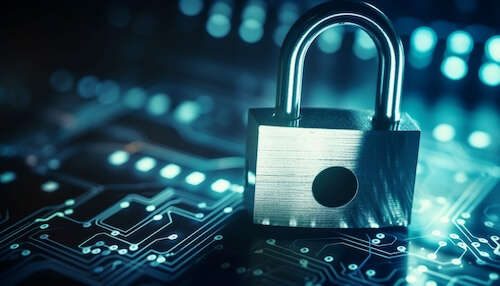How Microsoft Cloud for Sustainability Helps Organizations Grow
Microsoft Cloud for Sustainability can simplify your ability to determine the environmental impact of business operations and achieve sustainable...
In our modern digital era, lots of people and companies are now used to remote work. This means working from home is ...
In our modern digital era, lots of people and companies are now used to remote work. This means working from home is common, but it also means we need to make sure important information is safe and that our online security is good.
In this article, we're going to look at some important online cybersecurity tips for people who work remotely. These tips will help keep you safe and make sure your work stays secure.

The place where you work at home is really important for your remote job, and it needs to be super safe. Set up a special space in your home just for work, and make sure it's secure. This not only helps you focus better on your tasks but also makes sure nobody can get to your work without permission.
Also, make sure your gadgets like laptops and phones have encryption and passwords. It's best to not use public Wi-Fi for work as they can be vulnerable to cyberattacks.
Whenever possible, use company-provided equipment, as these are often configured with security measures to safeguard against threats. Many companies have a Bring Your Own Device (BYOD) policy, but that is usually complemented by procedures regarding how these devices should be secured.
Passwords act as the first line of defense against unauthorized access to your accounts. Avoid using weak or easily guessable passwords, and never reuse passwords across multiple accounts.
Instead, make sure to come up with strong and different passwords for every account. To help you handle these passwords well, think about using a trusted password manager. A solid password usually mixes capital and small letters, numbers, symbols, and doesn't use personal information like birthdays or names.
Multi-Factor Authentication (MFA) gives extra protection to your accounts. With MFA enabled, even if a cybercriminal obtains your password, they won't be able to access your account without the additional verification step.
Enable MFA for your email, cloud services, and other accounts that offer this feature. This usually involves receiving a code on your phone or another device when you log in, further validating your identity.
When communicating with colleagues, clients, or collaborators, opt for secure communication tools. These tools often offer end-to-end encryption, ensuring that your messages and files are only accessible to the intended recipients.
Be cautious when using public or unsecured Wi-Fi networks for communication, as they can expose your sensitive information to potential attackers.
Regularly updating your software and applications is crucial for maintaining your cybersecurity. Updates often include security patches that address vulnerabilities identified by software developers.
Failing to update your software can leave your devices and data exposed to potential threats. Set your devices and applications to update automatically whenever possible.
A Virtual Private Network (VPN) is a valuable tool for remote workers, especially when working from public Wi-Fi networks. A VPN encrypts your internet traffic, making it difficult for cybercriminals to intercept your data.
By using a VPN, you can ensure that your online activities are private and secure, reducing the risk of data breaches or unauthorized access.
Phishing attacks remain a common method used by cybercriminals to steal sensitive information. Be vigilant when it comes to emails and messages asking for personal or financial information. Look closely at the sender's email address and don't click on links or open files from sources you don't know. When in doubt, contact the sender through other means to verify the authenticity of the request.
Phishing attacks are no longer possible just via email; there are many attempts made using WhatsApp or Facebook Messenger - so be aware.
Making regular backups of your work-related data is really important to avoid losing data because of things like computer problems, accidents, or cyberattacks.
Think about using safe cloud storage options that keep your files encrypted from start to finish. This way, even if your device is compromised, your critical data remains safe and accessible.
While social media can be a valuable networking tool, exercise caution when sharing work-related information online. Cybercriminals often gather information from social media platforms to launch targeted attacks.
Limit the amount of personal and work-related information you share publicly to minimize the risk of becoming a target.
When sharing files with colleagues or clients, prioritize secure file-sharing platforms. These platforms typically offer end-to-end encryption and ensure that only authorized individuals can access the shared content.
Avoid using personal email accounts for work-related file sharing, as they may lack the necessary security measures.
Remaining well-informed about the most recent cybersecurity threats and adopting best practices is of paramount importance for remote workers. Engaging in cybersecurity training programs and workshops can significantly bolster your knowledge and skill set. There are numerous online resources and courses available to help you stay up-to-date with the ever-evolving landscape of cybersecurity.
Moreover, consider the convenience of pre-recorded security training sessions. You can easily use a screen recorder tool to capture these sessions, creating a valuable library of cybersecurity insights that you can refer back to at any time.
As remote work continues to shape the modern workforce, maintaining strong cybersecurity practices is essential for protecting sensitive information and ensuring organizational security.
By implementing these cybersecurity tips, remote workers can reduce the risk of cyberattacks, safeguard their data, and contribute to a safer digital environment for themselves and their organizations.
Microsoft Cloud for Sustainability can simplify your ability to determine the environmental impact of business operations and achieve sustainable...
Achieving success in hybrid work is no easy matter. Tools from Microsoft 365, such as Teams and Outlook, make it easy to stay connected and...
The digital workplace is rapidly changing, and IT workers play an increasingly vital role in that transformation. Companies must empower IT teams to...